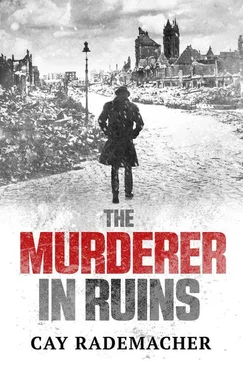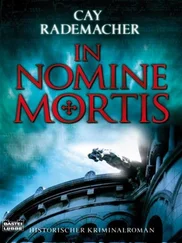Cay Rademacher - The Murderer in Ruins
Здесь есть возможность читать онлайн «Cay Rademacher - The Murderer in Ruins» весь текст электронной книги совершенно бесплатно (целиком полную версию без сокращений). В некоторых случаях можно слушать аудио, скачать через торрент в формате fb2 и присутствует краткое содержание. Год выпуска: 2015, ISBN: 2015, Издательство: Arcadia Books Limited, Жанр: Триллер, на английском языке. Описание произведения, (предисловие) а так же отзывы посетителей доступны на портале библиотеки ЛибКат.
- Название:The Murderer in Ruins
- Автор:
- Издательство:Arcadia Books Limited
- Жанр:
- Год:2015
- ISBN:9781910050750
- Рейтинг книги:5 / 5. Голосов: 1
-
Избранное:Добавить в избранное
- Отзывы:
-
Ваша оценка:
- 100
- 1
- 2
- 3
- 4
- 5
The Murderer in Ruins: краткое содержание, описание и аннотация
Предлагаем к чтению аннотацию, описание, краткое содержание или предисловие (зависит от того, что написал сам автор книги «The Murderer in Ruins»). Если вы не нашли необходимую информацию о книге — напишите в комментариях, мы постараемся отыскать её.
The Murderer in Ruins — читать онлайн бесплатно полную книгу (весь текст) целиком
Ниже представлен текст книги, разбитый по страницам. Система сохранения места последней прочитанной страницы, позволяет с удобством читать онлайн бесплатно книгу «The Murderer in Ruins», без необходимости каждый раз заново искать на чём Вы остановились. Поставьте закладку, и сможете в любой момент перейти на страницу, на которой закончили чтение.
Интервал:
Закладка:
Cay Rademacher
The Murderer in Ruins
A Cold Awakening
Monday, 20 January 1947
Still half asleep, Chief Inspector Frank Stave reached an arm out across the bed towards his wife, then remembered that she had burned to death in a fire storm three and a half years ago. He balled his hand into a fist, hurled back the blanket and let the ice-cold air banish the last shades of his nightmare.
A grey dawn light filtered through the threadbare damask curtains he had salvaged from the rubble of the house next door. For the last five weeks he had secured them to the window frames every evening with a few drawing pins he got hold of on the black market. The windowpanes were as thin as newspaper and even encrusted with ice on the inside. Stave was afraid that one of these days the glass would crack under the weight of the ice. Even the thought was absurd: these windows had been shaken by the shock waves from countless exploding bombs without shattering.
The blanket was frozen against the wall in places. In the dim early morning light the layer of hoar frost on the walls was so thick they looked as if they were covered with a layer of calloused skin. All that remained underneath was a few strips of wallpaper that might have been fashionable in 1930, stained plaster and in places just the bare wall itself: black and red brickwork and pale grey mortar.
Slowly, Stave made his way to the tiny kitchen, its icy floor tiles freezing the soles of his feet despite two pairs of old socks. With stiff fingers he groped around in the little counter-top wood-burner until at last he got a fire glowing in its tiny barrel-shaped belly. There was a stench of burning furniture polish because the wood he had been feeding into it used to be a dark chest of drawers from the bedroom of the house next door which was hit by a bomb back in the summer of 1943.
Not just a bomb, the bomb, Stave thought to himself. The bomb that took his wife from him.
While he waited for the block of ice in the old Wehrmacht kettle on top of the stove to melt and at the same time bring a little warmth into the apartment, he pulled off the old wool pullover, the police tracksuit, two vests and the socks in which he had slept. Carefully, he set them down on the rickety chair next to his bed. With an allowance of just 1.95 kilowatts of electricity a month – precious energy reserved for the hotplate and his evening meal – he didn’t switch on the light; he had taken care, as always, to lay out his clothes in the same order, so that he could put them on in the gloom.
Stave splashed glacial water on his face and body, the drops burning his skin, causing him to shiver involuntarily. Then he put on his shirt, suit, overcoat and shoes. He shaved slowly, carefully, in the half-light; he had no way of making lather and his razor blade was dull. New ones wouldn’t be available on the ration coupons for a few weeks yet, if at all. He let the rest of the water continue to warm up on the stove.
Stave would have liked freshly ground coffee, like he used to drink before the war. But all he had was ersatz coffee, a powder that produced a pale, grey brew when he poured the lukewarm water on it. He stirred in a spoonful of ground acorn roasted a few days previously, so that it at least had a bitter taste. Add a couple of slices of dry crumbling bread. Breakfast.
Stave had traded in his last real coffee at the railway station yesterday, in exchange for a few crumbs of worthless information. He is a chief inspector of police, a rank introduced by the British occupation forces, and one that to Stave, who grew up with terms such as ‘Criminal Inspector’ or ‘Master of the Watch’, still sounds odd.
Last Saturday he arrested two murderers. Refugees from East Prussia, who’d got involved with the black market and had strangled a woman who owed them something and thrown her body into a canal, weighted down with lump of concrete from one of the ruins. They’d gone to the trouble of hacking a hole in the half-metre thick ice to dispose of their victim. It was their bad luck that they had no knowledge of the local tides, and when the water went out their victim lay there for all to see, lying in the sludge beneath the ice, as though under a magnifying glass.
Stave quickly identified the victim, found out who she had last been seen with, and arrested the killers within 24 hours of her death.
Then, as he did every weekend when he was not overwhelmed with work, he went down to the main railway station and mingled with the endless streams of people on the platforms and asked around amongst all the residents of Hamburg who had been on foraging trips in the surrounding countryside and all the soldiers still retiring home: asked them in a hesitant, whispering voice, if they might have heard anything of a certain Karl Stave.
Karl, the boy who in 1945, at the age of 17, had signed up as a schoolboy volunteer in a unit bound for the Eastern Front, which by then already ran through the suburbs of Berlin. Karl, who had lost his mother, despised his father as ‘soft’ and ‘un-German’. Karl, who since the battle for the capital of the Reich had been missing, become a phantom in the no-man’s-land between life and death, maybe fallen in battle, maybe taken by the Red Army as a prisoner-of-war, maybe on the run somewhere and using a false name. But if that had been the case, would he not, despite all their disagreements, have got in touch with his father?
Stave wandered around, spoke to emaciated figures in greatcoats far too big for them, men with the ‘Russia face’. He showed them a grimy photo of his boy and was rewarded only by shaking heads, tired shrugs. Then, finally, someone who claimed to know something. Stave gave him the last of his coffee, and was told that there was a Karl Stave in Vorkuta, in a prisoner-of-war camp, or at least somebody who might once have looked like the boy in the photograph and whose name was Karl, maybe, and who was still behind bars there, maybe. Or maybe not.
Suddenly three knocks on the door jolted him out of his thoughts; to save a few milliwatts of power the chief inspector had pulled the fuse from the electric doorbell, For a split second he had the absurd hope it might be Karl, knocking on his door at this hour of the morning. Then Stave pulled himself together: don’t start imagining things, he told himself.
Stave was in his early forties, lean, with grey-blue eyes, short blond hair with just the first hints of grey. He hurried over to the door. His left leg hurt, like it always did in winter. His ankle had been stiff ever since he was injured on that night, back in 1943. Stave had a slight limp as a result, but was in denial of his handicap to the extent that he forced himself to jog, to do stretching exercises and even – at least when the Schulzes downstairs were not at home – rope-skipping.
In the doorway stood a uniformed policeman, wearing the high cylindrical Shako helmet. That was all Stave could make out at first. The stairwell had been dark, ever since somebody stole all the light bulbs. The policeman must have had to feel his way up the four flights of stairs.
‘Good morning, Chief Inspector,’ he said. His voice sounded young, trembling with nervous excitement. ‘We’ve found a body. You need to come right away.’
‘Fine,’ Stave answered, mechanically, before it hit him that the word was hardly appropriate in the circumstances.
Had he no feelings left? In the last years of the war he had seen far too many dead bodies – including that of his own wife – for news of a murdered human being to shock him. Did he feel excitement? Yes, the excitement of a hunter spotting a wild animal’s tracks.
‘What’s your name?’ he asked the young policeman, pulling on his heavy wool overcoat and reaching for his hat.
Читать дальшеИнтервал:
Закладка:
Похожие книги на «The Murderer in Ruins»
Представляем Вашему вниманию похожие книги на «The Murderer in Ruins» списком для выбора. Мы отобрали схожую по названию и смыслу литературу в надежде предоставить читателям больше вариантов отыскать новые, интересные, ещё непрочитанные произведения.
Обсуждение, отзывы о книге «The Murderer in Ruins» и просто собственные мнения читателей. Оставьте ваши комментарии, напишите, что Вы думаете о произведении, его смысле или главных героях. Укажите что конкретно понравилось, а что нет, и почему Вы так считаете.











